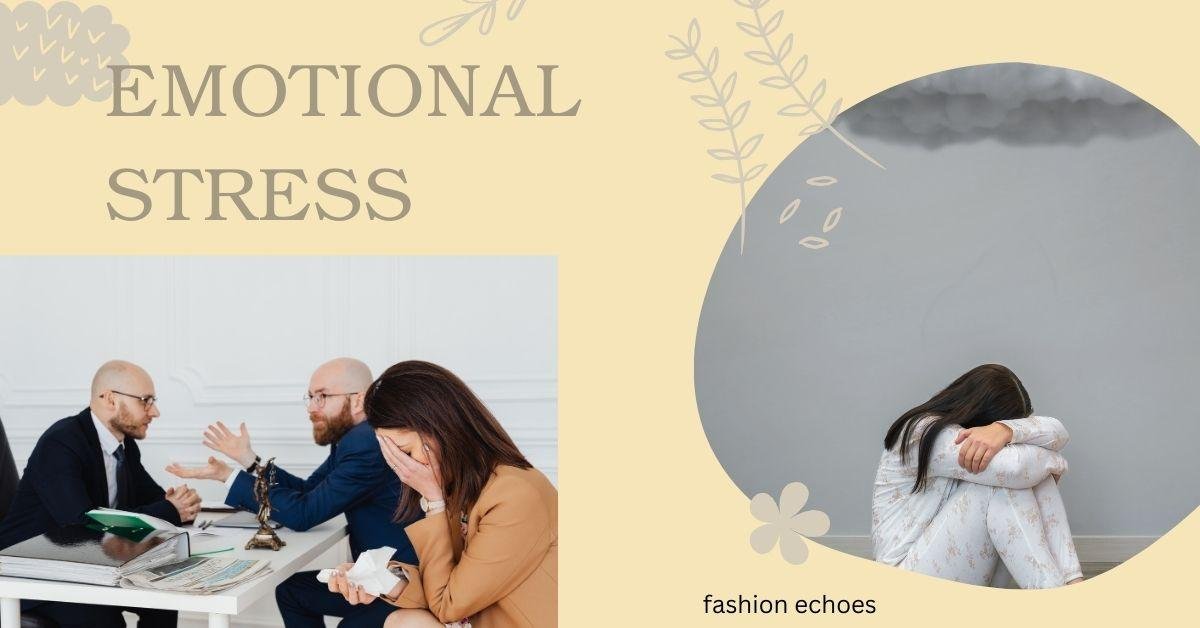You are well-acquainted with emotional stress if you have ever felt the difficulties mounting and your worry rising. Although it may seem annoying or even frightening at times, the reality is that there are numerous strategies to manage emotional stress so that you can lead a contented and joyful life even during difficult times.
What is emotional stress?
The term emotional stress refers to the psychological strain that stems from difficulties in life. Emotional stress is the feeling we get as we process and react to stressors that we face in our day-to-day lives. These stressors might be daily hassles like traffic jams, workplace politics, or juggling hectic schedules. They can also be caused by major life events like a death in the family, divorce, or career changes can also trigger emotional stress.
Left unmanaged, emotional stress can take a toll on our relationships, productivity, and mental health. It can even contribute to increased risk for medical conditions such as heart disease, diabetes, or chronic pain.
The good news is that proven emotional stress management techniques can help you stay grounded in the face of challenges. With the knowledge of self-care, you can keep emotional stress from overrunning your well-being. The signs of emotional stress manifest in various ways and can have both mental and physical symptoms. Recognizing these signs is the first step in addressing and managing stress effectively.
Physical manifestations of emotional stress:
Headaches: Headaches that are frequent or persistent may be a sign of underlying emotional stress. For instance, tension headaches are strongly associated with stress and can develop into chronic headaches if the underlying cause of the stress is not addressed.
Back, neck, or shoulder pain: Stress-induced muscle tension can result in back, neck, or shoulder pain. Using the right relaxation techniques can help alleviate this physical discomfort, which is a common emotional stress response.
Weight loss or increase: Unexpected weight loss or gain may arise from dietary changes brought on by emotional stress. While some people may completely lose their appetite, others may comfort themselves by eating more.
Try a guided meditation like Jay Shetty’s Slow the Swirl in Your Mind to reduce stress and encourage relaxation.
Breathlessness: Anxiety brought on by emotional stress may result in hyperventilation or dyspnea. This sensation can be concerning, and if it continues, medical help may be necessary.
One of the finest methods to lower anxiety and encourage feelings of calm is to take deep breaths. To deepen your breath and soothe your body and mind, try breathing into relaxation.
Feeling exhausted: Even after a restful night’s sleep, fatigue and ongoing exhaustion may indicate emotional stress. It may have an impact on day-to-day activities and general well-being.
Sleeping more or less than normal: Oversleeping or insomnia can result from emotional stress that interferes with sleep cycles.
Try one of our sleep-focused techniques, such as Unwind with Gratitude with Mel Mah, if you find that your sleep routine is not working out.
Reduced interest in intimacy: Emotional stress may cause a decline in intimacy, which may indicate underlying emotional issues or have an impact on interpersonal interactions.

Signs of emotional stress in the mind or behavior:
Feeling overburdened: Emotional stress may be indicated by a persistent feeling of inability to handle obligations or everyday duties.
Difficulties with memory and concentration: Stress impairs cognitive processes, which results in issues with memory retention and focus.
Depression and anxiety: Emotional stress may cause or worsen depression and anxiety.
Recognizing the reasons behind emotional stress
Stress on an emotional level does not just happen. There are frequently underlying causes for your feelings of stress. Although each person’s relationship with stress is unique, there are a few common causes of stress.
Individual connections
Relationships of all kinds can lead to emotional stress. A lack of support from your family, disagreements, or miscommunications can all lead to a great deal of stress. Stress can also result from romantic relationships. Emotional tension might result from issues like communication breakdowns or problems with trust. Any emotionally abusive relationship, whether with a family member or a partner, can lead to chronic stress and have an impact on mental health.
Please get expert assistance if you find yourself in this predicament. We desire your emotional safety as well as your physical safety.)
Pressures from the workplace
Burnout can result if you work in a demanding workplace or have a profession that calls for a lot of physical labor, long hours, and intense attention. Interpersonal issues, such as disagreements with bosses or coworkers, can cause emotional stress and a hostile work environment. Additionally, stress at work can increase if you are worried about losing your job or if you are not making progress in your career.
Major life transitions
Even joyful, significant life events can cause stress. Getting married, starting a family, or losing a loved one can all cause emotional turmoil. Anxiety and feelings of loneliness might arise from moving to a new location, particularly one that is far from friends and family. Additionally, losing a loved one can cause severe emotional stress. It can be quite difficult and emotionally taxing to mourn the loss of a loved one.
Unresolved feelings of emotion
If untreated, unresolved trauma from the past, whether it be from childhood or later in life, can continue to generate stress for anyone experiencing it. This also holds for unresolved former relationships.
Health concerns
Receiving a catastrophic medical diagnosis can create immediate and long-term emotional stress as individuals confront treatment and lifestyle changes. Chronic sickness can generate great stress, whether you’re the person suffering from a health difficulty or not.
Additionally, worrying about family members, particularly if they are elderly or far away, can lead to health-related stress.
Environmental and social factors
Living in a place where people are constantly worried about their safety can cause stress and anxiety. This can also occur if you’re living in an area where there are turbulent political times or societal prejudices against you or those you love.
Eight techniques for managing emotional stress
There are many healthy strategies to deal with emotional stress if you are feeling overburdened and pressured. These are a few of our top picks.
1. Prioritize taking care of yourself.
Take care of your body by getting enough sleep, eating a healthy diet, and exercising frequently.
Engage in pursuits that uplift your soul, such as hobbies, socializing, and taking nature walks.
Engage in meditation, prayer, or introspection to connect with your spiritual side.
Return to the here and now.
To become more present in your life and less anxious, try mindfulness meditation.
To assist you in distancing yourself from pressures, observe your thoughts objectively.
To alter your connection with emotional stress, reframe it.
Consider doing a meditation in the morning, such as Jay Shetty’s Mindful Morning.
2. Turn your attention outward
Engage in artistic endeavors or hobbies as a happy diversion.
Volunteering to assist others gives your life meaning and purpose that goes beyond your concerns.
Enjoy the healing effects of nature by spending time outside.
To process feelings, keep a journal.
Writing down emotions might offer a secure way to express and think about them.
Keeping a journal helps you identify triggers and cultivate self-awareness.
To stay motivated, reach milestones, and improve your attitude, set goals.
3. Examine mind-body techniques
Find what resonates by doing yoga poses, repeating calming mantras, or participating in guided meditation.
When under emotional stress, take deep, deliberate breaths to help your body and mind relax.
By bringing the mind and body together, these tools promote calmness and clarity.
Play relaxing music all around you.
To lift your spirits, play uplifting or calming music.
Try several kinds of soundscapes or listen to the sounds of nature.
Determine which auditory setting helps you feel less stressed.
During your busiest moments, try turning on a lovely soundtrack.
4. Improve your sleeping patterns
Maintain a regular sleep routine that allows you seven to nine hours each night.
A dark, peaceful, and comfortable bedroom helps guarantee restful sleep.
More restful sleep can result from limiting caffeine, electronics, and stressful activities right before bed.
Stress the key things
Create a support system of friends, family, or support groups that you can rely on when things get tough.
You can find peace by concentrating on your principles and the things that really count.
Calm can help reduce emotional tension.
Emotional stress is only one aspect of finding inner balance; another is developing a way of life that promotes mental, emotional, and physical health. Try different combinations to find the one that works best for you. Along the journey, practice self-compassion and patience.
Calm may be an invaluable travel companion. Its tools, which include Sleep Stories, guided meditations, and soothing music, are intended to help people relax and reduce stress.
Finding the sources of stress in your life is the first step toward stress management. This is more complicated than it seems. Finding the causes of chronic stress might be more difficult than identifying big stresses like moving, changing jobs, or going through a divorce.
It is very simple to ignore how your ideas, emotions, and actions affect your daily stress levels. You may be aware that you are always anxious about work deadlines, but your procrastination may be the source of your stress rather than the demands of your profession.






